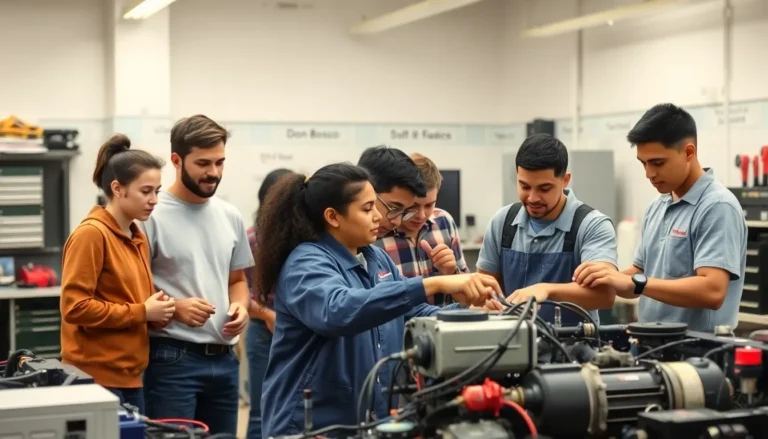In a world where everyone’s got a podcast and every car ride features a personal DJ, an audio technology degree is more than just a fancy piece of paper. It’s a ticket to the sound revolution. Whether it’s mixing tracks in a studio or mastering the next big hit, this degree opens doors to a symphony of career opportunities.
Table of Contents
ToggleOverview of Audio Technology Degree
An audio technology degree prepares individuals for diverse roles within the music and sound industries. Programs often cover key areas such as sound engineering, acoustics, and audio production techniques. Curriculum includes hands-on experience with industry-standard equipment and software, enabling students to develop practical skills.
Students engage in projects that foster creativity and technical precision. Collaboration with peers enhances learning, while exposure to real-world practices facilitates a smoother transition into professional environments. Courses may encompass topics like digital audio workstations, music theory, and sound design.
Graduates emerge equipped to pursue various career paths. Roles available include audio engineers, sound designers, and music producers. Many find employment in recording studios, broadcasting companies, and live event production.
Job prospects reflect the growing demand for skilled professionals in audio technology. According to the U.S. Bureau of Labor Statistics, employment of audio and video technicians is projected to grow by 21 percent from 2021 to 2031, much faster than the average for all occupations.
Networking opportunities arise during internships and industry collaborations, further expanding career options. Alumni often gain valuable insights and connections that enhance their career trajectories. Overall, obtaining an audio technology degree opens doors to fulfilling careers in a dynamic and evolving field.
Curriculum and Specializations

Audio technology degree programs offer a robust curriculum designed to equip students with essential skills for various roles in the audio and music industries.
Core Subjects
Core subjects form the backbone of audio technology education. Sound engineering principles lay the foundation for understanding audio signals and equipment. Acoustics courses delve into sound behavior in different environments, highlighting how spaces impact audio quality. Students also explore audio production techniques, which cover the entire process from recording to mixing. Hands-on training using industry-standard software enables students to familiarize themselves with professional tools. This structured approach prepares graduates for real-world challenges they will encounter in their careers.
Elective Courses
Elective courses allow students to tailor their education to specific interests within audio technology. For instance, courses in music production offer insights into creative songwriting and arrangement. Sound design electives explore creating unique audio effects, essential for film and video game industries. Further options may include digital media, which addresses contemporary trends in music distribution. Students might also take courses on live sound reinforcement, critical for those interested in concert and event audio. Such choices enhance the overall educational experience and foster specialized skill sets.
Career Opportunities
An audio technology degree opens numerous career pathways within the audio industry. Graduates often find themselves in various job roles that leverage their skills in sound production, engineering, and design.
Job Roles
Audio engineers handle recording and mixing, ensuring sound quality for various media. Sound designers create unique auditory experiences for films, games, and digital productions. Music producers oversee the entire music production process, guiding artists to bring their visions to life. Additional roles such as broadcast technicians and mastering engineers contribute to television and radio, enhancing sound quality for mass consumption. Students equipped with industry-standard skills readily transition into these positions, meeting the evolving needs of audio technology.
Industry Demand
Industry demand for audio professionals continues to rise. The U.S. Bureau of Labor Statistics projects a 21 percent growth in employment for audio and video technicians from 2021 to 2031. Advances in streaming services and content creation drive this growth, resulting in increased need for skilled workers. Companies seek professionals adept at handling cutting-edge technologies and software. Audio technology graduates not only possess relevant skills but also engage in networking opportunities during internships, further enhancing their employability in this competitive landscape.
Skills Developed
An audio technology degree cultivates a range of essential skills applicable in the music and sound industries. Students gain proficiency in sound engineering, allowing them to operate and maintain complex audio equipment effectively. Mastering audio production techniques enables them to create high-quality recordings pivotal for various media formats.
Hands-on experience with industry-standard software enhances technical abilities, equipping graduates with knowledge of digital audio workstations. Acoustics studies empower individuals to understand sound behavior in different environments, which is crucial for designing optimal recording spaces. Collaborative projects foster teamwork skills, vital for success in professional settings.
Communication skills are also developed throughout the program, allowing graduates to articulate creative ideas and technical concepts clearly. Networking opportunities during internships help students build connections that often lead to job placements. Critical thinking and problem-solving skills emerge from practical experiences, preparing students to tackle real-world challenges effectively.
Tailored elective courses offer specialization in areas like sound design and live sound reinforcement, which complement core education. Graduates emerge with a versatile skill set, well-suited for roles in audio engineering, music production, and sound design. Continuous practice and collaboration with peers keep skills relevant while adapting to the industry’s evolving demands.
An audio technology degree provides students with a comprehensive skill set that encompasses both technical expertise and essential soft skills, ensuring preparedness for a thriving career in audio technology.
An audio technology degree opens doors to a wealth of opportunities in a rapidly evolving industry. With the right blend of technical skills and creative insight, graduates are poised to thrive in various roles such as audio engineers and music producers. The hands-on training and collaborative projects enhance their readiness for real-world challenges.
As the demand for skilled audio professionals continues to rise, this degree remains a valuable asset. By staying current with industry trends and building a robust network, graduates can position themselves for long-term success in the audio technology field. Embracing this educational journey not only cultivates expertise but also fuels a passion for sound that can lead to a fulfilling career.




